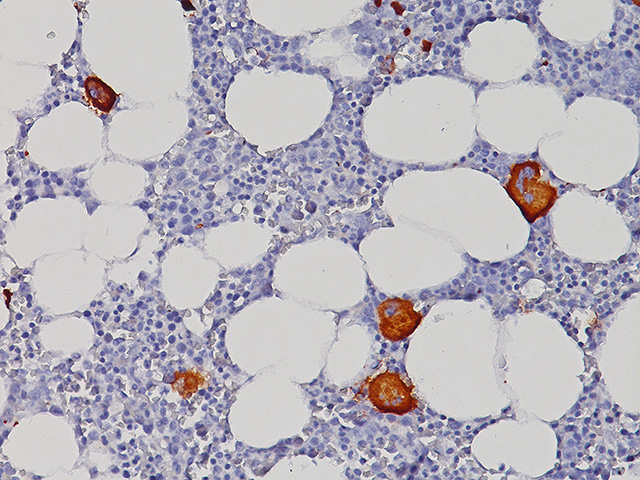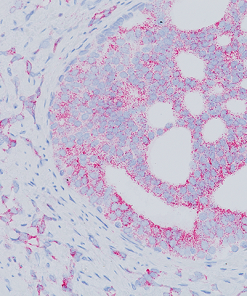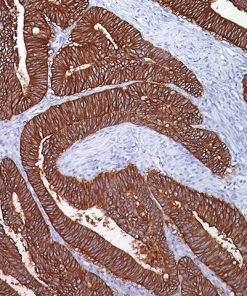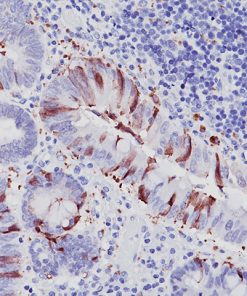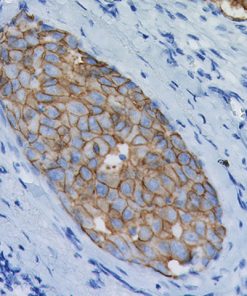CD11c (Leu-M5)
$287.00 – $1,073.00
Description
Product Description
CD11c (also known as Leu-M5 or Integrin alpha X) [5D11] is a member of the leukointegrin family. CD11c is a cell surface adhesion receptor and is predominantly expressed in tissue macrophages, dendritic cells, monocytes, NK cells and granulocytes. CD11c has been shown to be both sensitive and specific for hairy cell leukemia (HCL) (1). CD11c can be used to differentiate hairy cell leukemia from other small B-cell lymphomas (1). Vardiman et al demonstrated that when a bone marrow biopsy showed HCL, virtually all leukemic cells were positive for CD11c (2). In another study, all hairy cell leukemia cases were positive for CD11c and negative for CD5 (3). A panel of CD103, CD11c, CD25, CD5, CD10 and CD23 has been useful in definitively diagnosing hairy cell leukemia (3). Chronic myelomonocytic leukemia monocytes display a population of monocytes with CD11c underexpression which may aid in the diagnosis of chronic myelomonocytic leukemia (4). A panel using CD20 and/or DBA.44 as well as either TRAP, CD11c or Annexin A1 improves specificity when evaluating normal lymphocytes from hairy cells (5).
Dendritic cells play a key role in immunosurveillance. CD11c marks dendritic cells and was evaluated with regard to high-grade cervical intraepithelial neoplasia and prognosis. Specimens with higher rates of CD4+ T-cells, CD11c+ dendritic cells and T-bet+ transcription factors showed a strong correlation with favorable clinical outcomes (6). In a separate study, CD11c positive dendritic cells were dramatically reduced and macrophages were significantly increased in the skin of immunosuppressed renal transplant recipients which may correlate with increased risk of squamous cell carcinoma in these patients (7).
Specifications
Specifications
| Intended Use | |
|---|---|
| Source | |
| Species Reactivity | |
| Clone | |
| Isotype | |
| Antigen | |
| Localization | |
| Positive Control |
Data sheet & SDS
References
1. Johrens K, et al. A novel CD11c monoclonal antibody effective in formalin-fixed
tissue for the diagnosis of hairy cell leukemia. Pathobiology. 2008; 75(4):252-6.
2. Vardiman JW, et al. Evaluation of Leu-M5 (CD11c) in hairy cell leukemia by the
alkaline phosphatase anti-alkaline phosphatase technique. Am J Clin Pathol. 1988 Sep;
90(3):250-6.
3. Chen YH, et al. Immunophenotypic variations in hairy cell leukemia. Am J Clin
Pathol. 2006 Feb; 125(2):251-9.
4. Sojitra P, et al. Chronic myelomonocytic leukemia monocytes uniformly display a
population of monocytes with CD11c underexpression. Am J Clin Pathol. 2013 Nov;
140(5):686-92.
5. Noel P. Definition of remission, minimal residual disease, and relapse in hairy cell
leukemia bone marrow biopsy histology and immunohistology specimens. Leuk
Lymphoma. 2011 Jun; 52 Suppl 2:62-4.
6. Origoni M, et al. Prognostic significance of immunohistochemical phenotypes in
patients treated for high-grade cervical intraepithelial neoplasia. Biomed Res Int. 2013;
2013:831907.
7. Sandvik LF, et al. CD11c(+) dendritic cells rather than Langerhans cells are reduced
in normal skin of immunosuppressed renal transplant recipients. Acta Derm Venereol.
2014 Mar; 94(2):173-8.
8. Center for Disease Control Manual. Guide: Safety Management, NO. CDC-22,
Atlanta, GA. April 30, 1976 “Decontamination of Laboratory Sink Drains to Remove
Azide Salts.”
9. Clinical and Laboratory Standards Institute (CLSI). Protection of Laboratory
Workers from Occupationally Acquired Infections; Approved Guideline-Fourth
Edition CLSI document M29-A4 Wayne, PA 2014.
Browse more documents for this product (IFUs, datasheets, translations, SDS, and more).


